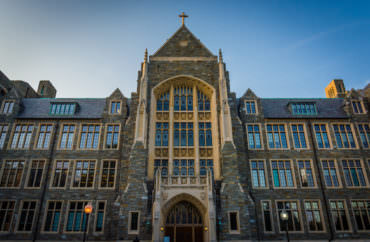
ANALYSIS: Activists accuse campus leaders of dragging feet, officials won’t comment on whether they will implement fee
Last April, a majority of Georgetown University students voted to approve a referendum calling for the creation of a $27.20 per student semesterly fee to benefit the descendants of slaves sold by the university in the 1830s, a move heralded as what could become the nation’s first slavery reparations fund.
Four months later, the organizers and proponents of that measure are now crying foul, accusing administrators of dragging their feet and avoiding the steps necessary to implement the fund, as the measure stated the fee would begin to be collected in the fall of 2020.
Activists reported on Sunday that their second summer meeting with administration failed to produce any specific plans. The hesitation prompted a public statement this week from the students behind the movement, also shared on the student government’s official Facebook page.
The Students for GU272 statement read in part: “neither the meeting nor the statement confirmed that this referendum will be implemented or created a comprehensive plan of action to address these questions. While university administrators have repeatedly articulated their commitment to continued dialogue, they have failed to clarify tangible steps forward. As of now, the advocacy team has not received clear indication of the university’s commitment to implementing the referendum. This measure was democratically voted on and approved by the student body, and we as students must continue to hold the administration responsible for implementing the referendum in a timely manner.”
The post also explained that over summer break administration had been willing to meet with and hear out student leaders, but voiced concerns and emphasized caution. The students claim the apprehension increased as fall (and the implementation deadline) approached.
Georgetown sophomore Connor Brennan, who co-sponsored the original bill as a Georgetown University Student Association senator last year, told The College Fix activists are frustrated.
He called the unproductive summer a “deliberate attempt by the University to circumvent the decisive voice of the students,” adding: “I believe I share the frustrated sentiments of many fellow advocates at the repeated heel-dragging by University administrators in delivering the justice these communities deserve.”
The approved student measure called for a $27.20 fee to be charged from each student once per semester and the funds would go to aiding living descendants of the 272 slaves who were sold to keep Georgetown afloat amid financial struggles soon after its founding. All allocation decisions would be made by the “GU272 Reconciliation Board of Trustees” made up of five current undergraduates and five representatives of descendant communities.
According to the activists’ post, administrators and critics fear a lack of accountability and poorly worded policies will muddy good intentions. University brass must agree to implement the fund for it to move forward, but full support does not appear to be there at this time.
In late May campus leaders ignored several requests for comment from The College Fix on whether Georgetown administration would approve the fee. A request for comment Thursday on the latest concerns from reparations proponents went unanswered.
In informal discussions on campus, some students have speculated one reason for administrative reluctance may be the precedent it would set. The activists claim in their statement that “$27.20 a semester by no means equals our debt to descendent communities; it is simply a first step.”
“Atoning for the sins of slavery must be an ongoing effort by every member of the Georgetown community,” the statement reads. “… We urge all students to dedicate time to educating themselves and others on the history of our university, and to develop a personal understanding of the slaveholding legacy that our university community is responsible for addressing.”
If university officials fear a Pandora’s Box of “debts” will be opened, perhaps their pockets (and not just the current students’) could be affected, giving them reason to pause.
MORE: Georgetown officials silent on whether they will implement slavery reparations fee
Like The College Fix on Facebook / Follow us on Twitter






Please join the conversation about our stories on Facebook, Twitter, Instagram, Reddit, MeWe, Rumble, Gab, Minds and Gettr.